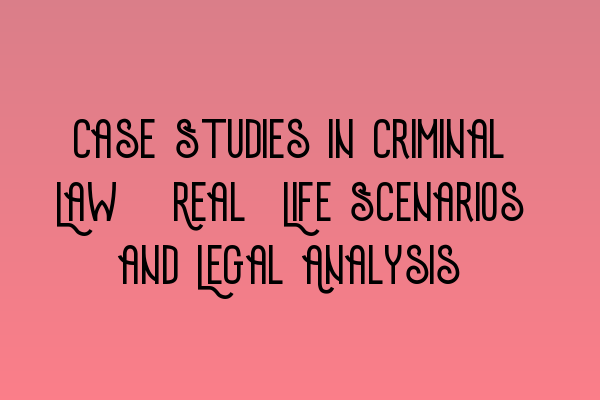Case Studies in Criminal Law: Real-Life Scenarios and Legal Analysis
At SQE Criminal Law & Practice Law UK, we understand the importance of studying real-life scenarios to gain a comprehensive understanding of criminal law. In this blog post, we will explore various case studies and provide legal analysis to shed light on the intricacies of criminal law practice. Whether you are a law student, aspiring solicitor, or simply interested in the field, this article will provide valuable insights into the application of criminal law in real-world situations.
Theft and Burglary: A Case Study
Let’s start with a case study involving theft and burglary. In this scenario, an individual is accused of breaking into a private residence and stealing valuable items. To analyze this case, we must consider several important aspects of criminal law, including the elements of theft and burglary, the burden of proof, and potential defenses.
In the UK, theft is defined as dishonestly appropriating property belonging to another with the intention to permanently deprive the owner of it. On the other hand, burglary involves entering a building as a trespasser with the intent to commit theft, grievous bodily harm, or criminal damage.
When analyzing this case, it is crucial to examine the evidence presented, such as CCTV footage, witness testimonies, and any forensic evidence collected from the scene. The burden of proof lies with the prosecution to prove beyond a reasonable doubt that the accused committed the theft and burglary.
However, the defense may argue that there is insufficient evidence to establish the accused’s identity, intent, or connection to the crime scene. Additionally, they may present an alibi or challenge the credibility of the witnesses.
To delve deeper into the legal analysis of this case and explore similar theft and burglary scenarios, you can read our related article on Legal Representation for Delaware LLCs in the UK: Expert Advice.
Assault and Self-Defense: A Case Study
Another intriguing case study involves an accusation of assault and the defense of self-defense. Assault occurs when one person causes another to apprehend immediate and unlawful violence. Self-defense, on the other hand, allows individuals to use reasonable force to protect themselves from imminent harm.
In this case, the accused claims they acted in self-defense after being physically attacked by the alleged victim. To analyze this case, we need to consider the elements of assault, self-defense laws, and the burden of proof.
Under UK law, assault requires proof of an intentional act that creates a reasonable fear of physical harm in the victim. However, self-defense provides a defense if the accused reasonably believed that the use of force was necessary to protect themselves.
When analyzing this case, it is essential to assess the circumstances leading up to the alleged assault, the severity of the threat faced by the accused, and any evidence or witnesses that may support their claim of self-defense. The burden of proof lies with the prosecution to establish that the accused’s use of force was unreasonable or disproportionate.
To further explore assault and self-defense cases and gain a better understanding of the intricacies involved, we recommend reading our article on Ensuring Ethical Business Practices: Delaware’s Code of Conduct.
Drug Possession and Trafficking: A Case Study
Lastly, we will delve into a case study involving drug possession and trafficking. Drug-related offenses are taken very seriously under criminal law, and the penalties can be severe. In this scenario, the accused is arrested for the possession and alleged trafficking of illegal drugs.
When analyzing drug-related cases, it is crucial to understand the specific laws and regulations surrounding drug possession and trafficking, the admissibility of evidence, and potential defenses.
In the UK, the Misuse of Drugs Act classifies drugs into different categories depending on their potential harm and medicinal value. The possession of controlled substances without a lawful excuse is a criminal offense, and trafficking involves the supply, production, or import/export of drugs.
Legal analysis of drug-related cases often involves examining the chain of custody of the seized drugs, laboratory reports, witness testimonies, and any potential violations of the accused’s rights during the search and arrest process. The burden of proof lies with the prosecution to establish that the accused knowingly possessed or trafficked illegal drugs.
To gain more insights into drug possession and trafficking cases and the legal strategies that can be employed, we recommend reading our related article on Legal Challenges for UK Businesses in the U.S.: Strategies for Overcoming Hurdles.
Conclusion
Case studies in criminal law provide invaluable opportunities to understand the application of legal principles in real-life scenarios. By examining various cases, analyzing the laws involved, and considering the burden of proof and potential defenses, individuals can gain a deeper understanding of criminal law practice.
At SQE Criminal Law & Practice Law UK, we strive to provide comprehensive resources and guidance to aspiring solicitors and individuals interested in criminal law. For essential study materials to help you prepare for the SQE exams and excel in your legal career, check out our article on SQE Exam Prep: Essential Study Materials for Aspiring Solicitors.
